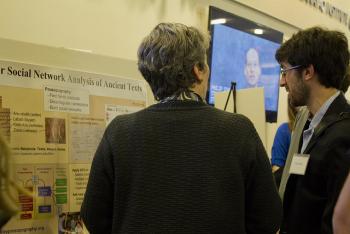Digital humanities research at Berkeley will be well represented at the MLA convention in Chicago, January 9-12, 2014, with Berkeley scholars participating in the following sessions:
- 66. The Semipublic Intellectual? Academia, Criticism, and the Internet Age (Liliana M. Loofbourow, presiding)
- 337. New Digital Vanguards in Spanish Literature (Alexandra Saum-Pascual, "Print Alternatives: Hybrid Spanish Writing Today,)
- 339. New Ways of Reading: Surface Reading and Digital Methods (Stephen M. Best, speaking)
- 416. Digital Practice: Moving Images (Deniz Göktürk, presiding; Tara Hottman, "Remixing Herzog: Auteurship and Participation in the Digital Age")
- 485. Digital Practice: Social Networks across Borders (Bonnie Ruberg, "Kafka and the Kafkaesques: Close Reading Online Fan Fiction")
- 658. New Directions in William Carlos Williams Studies (Serena Le, speaking)
- 748. Tumblr Vulnerabilities (Nicholas Mitchell, speaking)
- 807. Traffic (Mark Goble, presiding)

Berkeley scholars and tool developers-- including Marti Hearst and Aditi Muralidharan (WordSeer), Eric Kansa (Open Context), Niek Veldhuise and Laurie Pearce (Berkeley Prosopography Services), also participated in the Data Science Faire as part of the launch of the new Berkeley Institute for Data Science (BIDS) on December 12th. While most of the commonly-referenced examples of "data science" are drawn from the biological, physical and social sciences, many digital humanities tools and methodologies also enable reproducible research. The Data Science Faire was the first of many BIDS events where scholars in the humanities and the sciences can learn more about each other's approaches, and how they might be applicable in a different domain.
(Thanks to Mark Sample for his annual list of digitally-inflected talks at the MLA.)